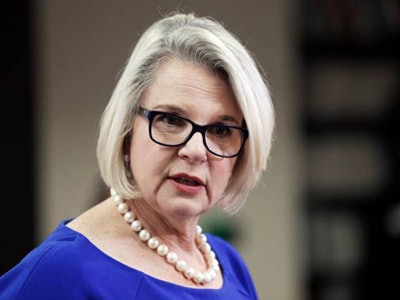WASHINGTON — Containing college costs and streamlining financial aid must be at the forefront of the nation’s higher education agenda, University of North Carolina system president Margaret Spellings said Tuesday at a gathering meant to forge a more bipartisan approach to federal higher education policy.
“For most families in the U.S., the single most important fact about higher education is it’s not affordable,” Spellings said.
 University of North Carolina System President Margaret Spellings Margaret Spellings
University of North Carolina System President Margaret Spellings Margaret Spellings“Even at public institutions, most families can’t pay out of pocket for a year of higher education. Most families don’t have anywhere near the savings to support a child for two or four or often five or six years of study,” Spellings continued. “We have sold college as the golden ticket to middle class opportunity, then priced average families out of that market.”
Spellings — who served as U.S. Secretary of Education under President George W. Bush — said higher education is facing many of the same issues that it faced when as secretary she oversaw a higher education reform commission known as the Spellings Commission.
She said as the world becomes more competitive and demands higher levels of education, America is at risk of letting “inequities in access harden into [an] unbridgeable economic divide.”
“Too many families look at the cost of college and see a closed door, not just to education but to the promise of middle class stability that is still at the core of the American dream,” Spellings said. She said there are “growing questions about whether the colleges and universities in our country are fulfilling their role as the engine of upward mobility and growing resentment from those who feel shut out.”
Despite the political popularity of free college proposals and plans — from the Tennessee Promise to the Excelsior Scholarship program in New York State to U.S. Sen. Bernie Sanders’ 2016 presidential campaign proposal to make college free for all — Spellings said it would be more beneficial for policymakers to focus on allocating resources in a more efficient manner to benefit those of lesser economic means.
“Instead of looking for politically appealing solutions, we must look for the most meaningful impact,” Spellings said. “Instead of doing away with tuition, which will subsidize millions of well-resourced families, we could target financial aid more effectively.
“We must develop funding formulas that reward institutions that leave students better off and shift investment from those that don’t.”
Spellings made her remarks Tuesday at the Urban Institute for an event titled “Beyond the Partisan Divide: Charting a Principled Approach to Federal Higher Education Policy.”
The event featured speakers who served in the administrations of President Barack Obama and President George W. Bush.
The event also served to highlight a series of policy papers written by scholars from diverse ideological backgrounds and collectively dubbed as “Memos to Congress and the Administration on Higher Education.” The papers touch on topics that range from the need for better data and transparency around institutional performance to simplification of federal financial aid.
Much of the conversation focused on how to measure higher education outcomes, whether that role is best left to states or the federal government, what indicators to use and whether some instruments may be too blunt to truly capture the “value-add” of a given college or university.
“I’m a fan of information-based accountability, because ‘one-size-fits-all’ just doesn’t work with the diversity of American higher education,” said Ted Mitchell, former U.S. under secretary of education under President Obama and now president of the American Council on Education.
Mitchell stressed the importance of colleges and universities being subject to measurements on their own terms that essentially answer the question of whether they are fulfilling their particular mission.
Spellings emphasized the need to gauge how well institutions are serving particular groups of students, lamenting that “anyone can educate a valedictorian.”
“We need some marketing around expectations,” Spellings said. “What is the marketplace requiring and demanding? We need leadership around that.”
Spellings — who half joked that she was becoming an expert in Civil War sculpture, an apparent reference to protests over confederate monuments at UNC Chapel Hill — also complained that America’s colleges and universities have become unwilling participants in the nation’s culture wars, which she said in turn impedes their ability to serve students well.
“I’ve increasingly come to believe that the true test of leadership in higher education is to avoid the tyranny of the urgent, and believe me this is hard, resisting the endless stream of high-profile distractions that take us away,” Spellings said. “That is especially true now, when higher education has become the preferred venue for some of the sharpest partisans and some of the most strident cultural warriors in the public square.”
Spellings added, “We’ve always been an arena for debate and controversy but now we are a regular actor in political dramas we didn’t create and usually don’t control, and that takes a toll, both in terms of public perception and in our day-to-day ability to get things done.”
Spellings said what is needed is civic leaders who are interested in serving institutions instead of using them. She also stressed the need for state and federal policymakers to invest in the “long-range prosperity that flows from a better educated citizenry.”
“The source of our strength has always been a vision of education that includes everyone, that reflects the country it serves,” Spellings said. Then, borrowing language from the report issued by the Spellings Commission she oversaw over a decade ago, she said: “Making that a reality is our most urgent task, today’s test of leadership.”
Jamaal Abdul-Alim can be reached at [email protected] or you can follow him on Twitter @dcwriter360.


















